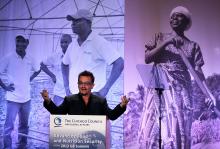the ONE campaign

In a room filled with African heads of state, captains of industry, leaders of international development and countless executives from NGOs at the G8 Symposium on Global Agriculture and Food Security in Washington, D.C. late last week, stood one Irish rock star — Bono, the lead singer of U2 and co-founder of the ONE Campaign.
At first blush (to the uninitiated, perhaps), Bono's presence might seem incongruous, but most of the folks in the room at the Ronald Reagan building a few blocks down Pennsylvania Avenue know the Irishman more for his tireless humanitarian efforts than his closet full of Grammy awards. For more than 25 years, Bono, 52, has been involved deeply and effectively in international affairs as a champion for the poorest of the poor.
"Can we manage the oil as well as the farmland? Manage it properly, responsibly, transparently?" Bono asked the audience. "Because when we don’t, you know what happens. Hundreds of billions of dollars got lost to oil and gas corruption in Nigeria. That’s what the watchdog groups are telling us. Just mind blowing. Huge numbers.
"Crops need sunlight. So does resource extraction. Both need sunlight’s disinfecting glare. Isn’t transparency the vaccine to prevent the worst disease of them all? Corruption. Everybody here knows that corruption kills more children than HIV/AIDS and malaria combined. So that’s what I want to leave you with. That very simple word. That very simple concept. Easy to say. Much harder to realize, especially in law. The word 'transparency.'
"We won’t have food security without it," he said. "But we will have oil riches without it but those riches will be held and hidden by very few hands."

Hearing about the injustice and suffering in our world can be overwhelming. The problems seem so insurmountable. Is it really possible to make a difference?
Well, here's some good news. We already are making a big difference. Consider these statistics cited by Dr. Scott Todd from Live58:
"We used to say that 40,000 children die each day from preventable causes. In the 1990s, that number dropped to 33,000 per day. By 2008, it dropped again to 24,000. Now it is down to 21,000. That means that in a generation we cut that number in half. 1.4 billion people live in extreme poverty today. That's a staggering amount, but let's put those numbers in perspective: In 1981, 52 percent of the world lived in extreme poverty. Today it's 26 percent. Again, that means we have cut the number in half, and we did it in one generation."
Now, if you are anything like me then your reaction to poverty is a mixture of compassion and helplessness. If you're reading the Sojourners blog, then I assume that you already care about the least like I do, and that you know how big the problems are. I often find myself asking: What can I do? What can anyone do? We've heard the bleak statistics before. It's not news that there is a problem.
The news is that there is actually hope for real change.
 Yes, it's odd, having a rock star here—but maybe it's odder for me than for you. You see, I avoided religious people most of my life. Maybe it had something to do with having a father who was Protestant and a mother who was Catholic in a country where the line between the two was, quite literally, a battle line. Where the line between church and state was… well, a little blurry, and hard to see.
Yes, it's odd, having a rock star here—but maybe it's odder for me than for you. You see, I avoided religious people most of my life. Maybe it had something to do with having a father who was Protestant and a mother who was Catholic in a country where the line between the two was, quite literally, a battle line. Where the line between church and state was… well, a little blurry, and hard to see.
I remember how my mother would bring us to chapel on Sundays… and my father used to wait outside. One of the things that I picked up from my father and my mother was the sense that religion often gets in the way of God.
For me, at least, it got in the way. Seeing what religious people, in the name of God, did to my native land… and in this country, seeing God's second-hand car salesmen on the cable TV channels, offering indulgences for cash… in fact, all over the world, seeing the self-righteousness roll down like a mighty stream from certain corners of the religious establishment…
I must confess, I changed the channel. I wanted my MTV.
Even though I was a believer.
Perhaps because I was a believer.
~ Bono of U2, in his 2006 National Prayer Breakfast keynote address
Adam Phillips is a Evangelical Covenant Church minister and director of faith mobilization for the ONE Campaign, www.one.org.
This video is the latest installment in an ongoing series at God's Politics where we've asked leading clergy, writers, scholars, artists, activists and others who self-identify as "evangelical" to answer the question, "What is an Evangelical?"